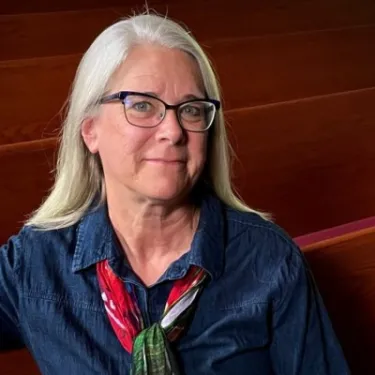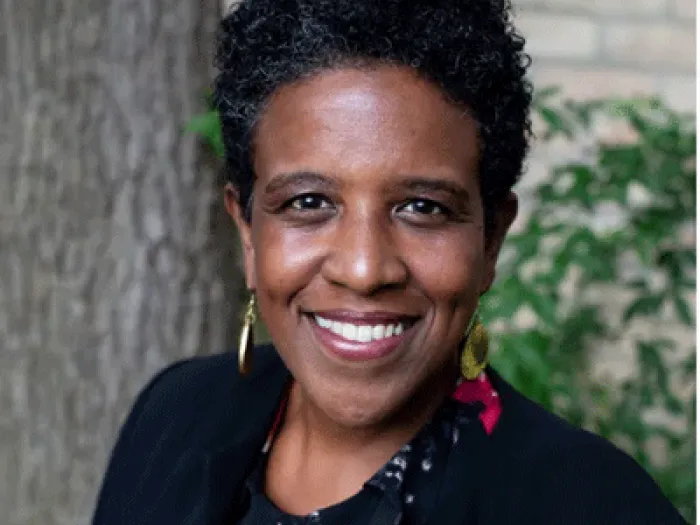Unification Commission approves its Interim Governance Operating Manual
Commissioners decline full commission membership to the Co-Moderators of the 226th General Assembly

LOUISVILLE — On Friday, the Unification Commission settled the question of whether the Co-Moderators of the 226th General Assembly — the Rev. Tony Larson and the Rev. CeCe Armstrong — should have both voice and vote at commission meetings, determining they will have voice but not vote.

That vote came after commissioners heard from Laurie Griffith, Associate Director of Constitutional Interpretation. Discussion on whether last year’s change in the Standing Rules of the General Assembly enabled the Co-Moderators to become members occurred during the first day of the UC’s meeting on Thursday.
Griffith told commissioners that even though the 226th General Assembly passed a sentence in the new Standing Rules that “says clearly the Moderators will serve as members by virtue of their office, it is qualified in accordance with the Organization for Mission,” which the Unification Commission will be rewriting ahead of the 227th General Assembly (2026).
“The Unification Commission certainly has power and responsibility to amend the Organization for Mission,” Griffith said. “That’s a long-winded answer to say, yes, it is perfectly constitutional to do what you have proposed” — that is, give the Co-Moderators voice but not vote on the commission.
“I am grateful for your call to ministry and for your call to this office,” UC Co-Moderator the Rev. Dr. Felipe Martínez told the Co-Moderators. “I’m grateful for your wisdom and faithful witness, and I look forward to a continuing partnership that allows your voice to heard and for your work to impact this particular commission and the life of the Church.”
The discussion over membership on the 12-member Unification Commission was part of the unanimous adoption Friday of the commission’s Interim Governance Operating Manual, which can be found here. Developed by the UC’s Ministry Coordination Committee, the manual was written to guide the UC and the executive leadership of the Interim Unified Agency as the UC assumes governance tasks formerly handled by the Committee on the Office of the General Assembly and the Presbyterian Mission Agency Board, both of which the UC terminated on Dec. 31, 2024.
The additional responsibilities for the UC fall in three areas:
• Roles and responsibilities of the UC co-moderators and appointed members
• UC committee structure
• Clarification of the relationship between the UC and the Rev. Jihyun Oh, Stated Clerk of the General Assembly and Executive Director of the Interim Unified Agency.
According to the manual, reviews of the 2022-24 Organization for Mission and the operation manuals for COGA and PMAB “have provided critical guidance in establishing the UC’s interim governance and operational roles and responsibilities.”
The UC will ensure “that the work of the IUA continues to support the broader mission of the Church, focusing on support for mid councils and congregations as they carry out their mission.” Interim governance roles include mission priority and strategic planning, financial and resource oversight, General Assembly planning, leadership support and evaluations, General Assembly committee support and stakeholder engagement.
In addition to a Planning Committee, the UC now has this committee structure:
• The Relationship Coordination Committee’s responsibilities include making recommendations to the UC regarding mid-council support, reaching out to other boards and committees and providing necessary linkage to the General Assembly for entities needing access to complete their work.
• The Ministry Coordination Committee is tasked with ensuring oversight work formerly carried out by COGA and PMAB is managed or reassigned during the interim period, coordinating with and providing oversight for Oh and her work, coordinating with and providing oversight for the Unification Management Office still being developed, designing a process to facilitate the ongoing review of mission effectiveness and program delivery, working with Oh to develop an outline for a report to the 227th General Assembly, developing the final Organization for Mission, and, in coordination with Oh and the GA Co-Moderators, reviewing and recommending the docket for the 227th General Assembly and the assignment of business to the committees.
• It’s the work of the Resource Coordination Committee to work with the Administrative Services Group on budget/finance and resource development, coordinate with the A Corp Board for the overall stewardship of PC(USA) resources, and collaborate with Oh and ASG to determine the General Assembly per capita apportionment that will be recommended to the GA.
The manual also includes the responsibilities assigned to UC co-moderators Martínez and Cristi Scott Ligon as well as the responsibilities of the Stated Clerk/Executive Director.
In a section on communications, the UC and the SC/ED are to maintain regular communication “to ensure that staff members are kept informed about changes in governance, structure and operational adjustments.” Regular updates should also be shared with mission partners, mid councils and congregations “to maintain transparency and ensure support for unification.” In addition, when it’s appropriate, the commission shall “make public statements regarding the progress of unification, emphasizing the vision for the unified organization.” Those communications will be developed in collaboration with the SC/ED and the unified communications office.
At the end of the unification process, “when there is a clear operations structure,” the UC will develop a transition plan including a permanent governing structure and a recommendation that the General Assembly Nominating Committee consult with the GA Committee on Representation nominate a slate for the permanent governance body for election by the 227th General Assembly (2026).
The UC will forward to the GA documents including a recommended final governance document [the Organization for Mission]; recommendations for amendments to existing standing rules, manuals, and/or governing documents; and any additional recommendations related to the new agency structure.
After lunch on Friday, commissioners received ethics training from April Davenport, the PC(USA)’s general counsel. Commissioners then met in closed session but announced they’d taken no action afterward.
The next meeting of the Unification Commission is March 20-21 at the Presbyterian Center in Louisville, Kentucky. Meetings are livestreamed here.
You may freely reuse and distribute this article in its entirety for non-commercial purposes in any medium. Please include author attribution, photography credits, and a link to the original article. This work is licensed under a Creative Commons Attribution-NonCommercial-NoDeratives 4.0 International License.




